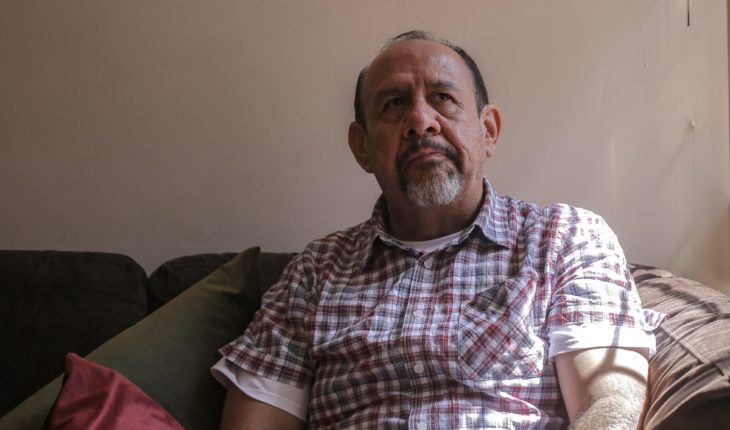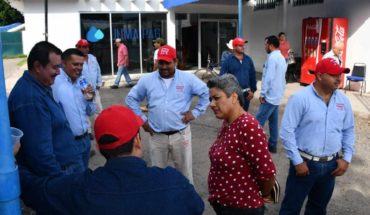Daniel García Rodríguez spent the last 17 years of his life in prison and says that in all that time he did not meet a single inmate who has arrived in jail for a judicial investigation that resulted in a judge’s sentence.
“Where I was I never saw a kidnapper arrested. There’s no such thing. Never in the 17 years I was in there, I saw an investigation case. There is not a single case, at least that I have seen them arrive, that has been located because of an investigation.”
García, who is still accused of being the intellectual author of the crime of the councilor of Atizapán María de los Angeles Tames Pérez, committed on September 5, 2001, was released from prison because the judge currently running his case allowed him to follow the process in freedom.
That means he spent all that time—in the Barrientos prison, in Tlalnepantla, State of Mexico—subject to pre-trial detention, without sentencing, as did Reyes Alpízar, who was flagged as material accomplice of that crime.
Reyes and Daniel were charged with participating in the same crime, imprisoned on October 25, 2002, and were released together on August 24, 2019. Each lived the case differently: Reyes Alpízar did not receive as much media attention, but he denounced that he was tortured by the case and suffered the “normal” deficiencies in prison; while Daniel Garcia was exposed to the media as “the murderer of the ruler”, but acknowledges that in prison he was a privileged guy.
“Because I was rooted along with the then municipal president—Antonio Dominguez, also accused of being the subject of the crime—the media was down the hotel,” he told Political Animal.
For him, the impact and media pressure was so harsh during his detention and his period of roots, that when he was taken to prison he finally felt a strange sense of “relief.”
“Yes, it’s a strange feeling, because of the context, but it’s true, it really turns out that when we get out of the hotel, Antonio Dominguez and I were screaming, there were about 500 people screaming. They took us on patrols and took us from the hotel to Barrientos live on the two o’e.m. TV.
Reads: Edomex prosecutor ratifies end to pre-trial detention for men aged 17 without sentence
My family was marked. They were the sons of the murderer, murderer, criminal. That’s a burden, a burden for them and them.”
Daniel Garcia is originally from Atizapán, just like his family. From a very young age he joined the Institutional Revolutionary Party (PRI) and at the age of 16 he had his first public office in the municipal administration. Over the years he was a two-time adviser to municipal presidents, an adviser to Roberto Madrazo when he was a senator and was also private secretary to two mayors. Until a year before he was arrested he had been private secretary to Antonio Dominguez.
When the crime of the regiador happened, Daniel Garcia was engaged in livestock. He had a 130-headed herd with his father, who also ran a bakery. He claims he met Reyes Alpízar until they were both charged with the crime of the ruler.
Already in prison, Daniel García devoted himself to studying Mexican law and international law. He was six years in charge of the prison library and gathered an important collection of books. He had a space of his own to cook his food and his family always made sure that he did not miss anything.
Garcia describes his prison experience as a “sabbatical” period in which he was relatively “comfortable” dedicated to studying.
“It’s not me who had their time taken away. In my particular case my prison status, I do not know if I am going to say a barbarity, but it was like sabbatical sabbaticals, it is like being in a retreat because I gave myself the task of reading, of studying, of preparing, and my routines were comfort enough to take care of.”
Without revealing names, he recounted that he lived with “important” criminals imprisoned for drug trafficking and famous assaults.
“There’s a lot of know in there. I met firsthand how it works (the justice system) and you know not only how you think (prisoners) but why. But it goes further, you know how it might be that they haven’t, their fears, their traumas.
They are not how the pursuit of justice observes them. That mechanism of sending cops no longer works because they are no longer afraid of them and when they are touched, bought and worked for them,” said Daniel Garcia.
You may be interested: Daniel and Reyes serve 17 years in pre-trial detention, the longest without sentencing in the world
And while his case is emblematic of the flaws in the process that caused him to spend so many years in prison without receiving a sentence, he believes his experience will help speak with authorities about the failures of the judicial system.
“100 percent of the people who are there are direct signs or flagrance but not for an investigation,” he said.
Daniel Garcia acknowledges that both he and his “important” companions were relatively isolated from the general population. They had that privilege that allowed them to be safe from riots and assaulted. Prison rules.
The Covenant of the Accused
Daniel García and Reyes Alpízar met when he initiated the legal process against him, when they were both in Barrientos prison. According to the two accounts, Alpízar was tortured to declare that Daniel García and Antonio Dominguez paid him and Jaime Martínez Franco (alleged material author) for committing the crime.
Daniel Garcia says he has never had a grudge against Alpízar, as he claims that he was always aware of the way that statement was drawn.
After the release of former mayor Antonio Dominguez, they realized that they were alone in the process and that without means of communication, they said, the case had been built to blame them and imprison them.
They were in “pablos” terms, a term in prison slang that refers to people who are enlisted to pay for a crime they did not commit. It is when it is imminent that the Public Prosecutor’s Office is not going to look for another culprit, Garcia explains.
“We talked about Reyes Alpízar and I and realized that we were already finished because we had already been blamed. We were in the characteristic of pablos, that is, payers.”
The options were to continue to wait indefinitely for the judge’s sentence or to continue to give the legal battle. At no point did they consider pleading guilty.
“We looked at Reyes and I and I told him that the only thing that was going on was death and that there we had two alternatives: either we ended up there to be sentenced or we kept fighting.”
The difficult return home
Daniel Garcia had been told the prison that it would be difficult to re-adapt to street life once he achieved his freedom. He didn’t believe it, but it’s actually been as he was told. The first difficulty he has faced are dizziness and nausea when traveling by car.
“It’s not easy to get used to it, just a few days ago, three blocks ago I got dizzy like I was on the roller coaster. That along with the way of sleeping, the way you eat. In the morning it was the first time I grabbed a cover. There they are forbidden to the spoons because they take their edge and turn them into weapons.”
Garcia no longer remembered what silence was like because despite being in a “safe” area, he did not escape the hustle and bustle of the spokes and horns placed less than four meters each with the volume at the highest level, and the daily quarrels, to creepy conversations , to listen to violent life stories.
But that’s the acquis he now has for his next projects, in what he hopes to reveal how Mexican justice works. One important thing for him is that prison taught him not to be afraid for things that might happen, so he plans to devote himself to talking unevenly about all the secrets that prison taught him for almost 17 years.
What we do in Animal Político requires professional journalists, teamwork, dialogue with readers and something very important: independence. You can help us keep going. Be part of the team.
Subscribe to Animal Politician, receive benefits and support free journalism.#YoSoyAnimal





